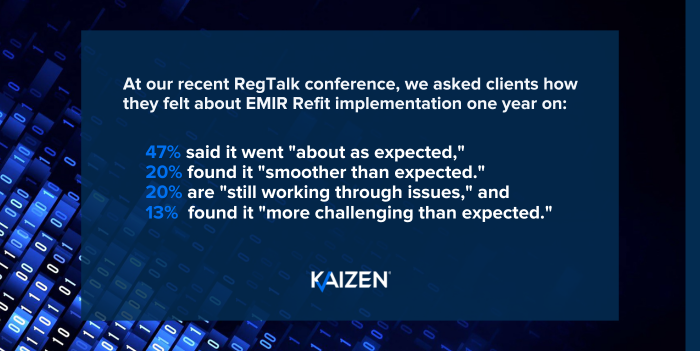Delegated Reporting: The Danger of ‘Out Of Sight, Out of Mind’ reporting

At Kaizen, we see firsthand how widespread delegated reporting has become across the UK and EU financial services industry. It was one of the main panel topics at our recent Kaizen RegTalk conference where I was joined by Alpha FMC’s Bernardo Castel-Branco, Regis TR’s Nick Bruce and Fredrik Karlsson from SEB. The conversation was facilitated by ISDA’s Andrew Bayley.
Delegated reporting is effective in enabling firms, especially the buy-side, to simplify their reporting operations. However while you can delegate the physical act of reporting, you cannot delegate the legal liability. As we frequently discuss with our clients and at the events we hold, the belief that ‘out of sight is out of mind’ is a dangerous misconception.
The central challenge: oversight without duplication
Under EMIR and SFTR, there are specific scenarios where delegated reporting is mandatory. But voluntary delegated reporting is also common in whole or in part for certain market segments. During the panel, we shared an example from agency securities lending, where asset management firms often completely outsource security settlement, custody, collateral management, lending, and reporting. In some cases, their first awareness of any reporting issue comes from a regulator inquiry, not their own internal checks.
This is the key problem with delegated reporting: it can reduce operational burden, but it doesn’t reduce liability. The challenge is to ensure you have oversight and the right controls in place without rebuilding the whole reporting function that you were trying to outsource in the first place.
Common mistakes we see in delegated reporting
Our panel shared four mistakes that they see frequently across the industry:
- Treating it as free: The “zero cost add-on” model – where reporting is offered free alongside other services like custody is common but often causes problems. Limited resources go to delegated reporting because it is viewed as non-commercial, so service quality suffers and controls can be found lacking.
- Managing issues at the wrong level: Errors and omissions are often managed at the omnibus account level across all clients rather than tackled on a firm-by-firm basis. This prevents firms receiving firm-level regulatory oversight from the delegated reporter and being able to communicate issues and remediation plans with the regulator. When problems arise, firms often can’t establish the materiality or set realistic timelines for resolution.
- Weak agreements: Standard agreements are typically written to limit delegate liability rather than ensure service quality, which doesn’t help the delegating firm to enforce standards with the delegate or meet their regulatory obligations.
- Missing the required data: Firms often lack access to underlying data from books and records, trade repositories and approved reporting mechanisms (ARMs) needed for proper oversight. If you can’t independently verify what’s being reported on your behalf, you’re taking an unnecessary risk.
Best practices for effective oversight
At Kaizen RegTalk we asked our audience of more than 200 clients what was the most important aspect of successful delegated reporting.
- Shared understanding (38% of poll respondents said this was crucial): This requires ongoing dialogue between delegating firm and delegate. You can’t assume your delegate understands your business requirements, you need to actively manage this relationship. In practice, this means building your control framework with systems that let you monitor delegate performance without recreating the entire reporting function.
- Strong, independent controls (36%): The delegating firm must maintain the ability to independently verify the quality of their reporting. This includes reconciliation and access to trade repository data for basic checks. You also need ways to assess what’s important, and documentation showing queries raised and responses received.
- Clear communication (17%): Regular updates and processes to resolve disputes are critical. When issues arise, you need defined escalation paths and service level agreements for resolution. The panel emphasised keeping delegated reporters “under pressure” through regular challenging to show that you’re actively engaged and expect high standards.
- Well-defined roles (9%): Both parties need to understand exactly what’s expected and when. You also need the ability to terminate the relationship and report directly if the service quality deteriorates. The FCA’s approach allows flexibility in materiality judgments. Firms must exercise best judgment about what’s material for regulatory purposes versus what’s material for their business.
Looking Ahead
The panel highlighted several challenges they are seeing more often, including:
- Resource conflicts between commercial priorities and delegated reporting quality
- Cross-border complexity creating operational headaches for teams
- Fragmented technology and incomplete datasets mean reconciliation tools are struggling to piece together trade flows and reporting requirements to validate reports.
Most importantly, the panel was concerned that knowledge retention* is becoming an issue as teams move between projects or are outsourced or offshored.
What was the panel’s conclusion?
Delegated reporting can work, but only with active oversight. The “out of sight, out of mind” approach simply doesn’t work.
You can delegate the reporting, but you can’t delegate the liability. If done right, it reduces operational burden while maintaining standards but done wrong, it creates dangerous blind spots that regulators will likely find.
- For help in establishing effective control and oversight of your delegated reporting, please get in touch.
- Find out more about how our SFTR Daily Controls can support your delegated reporting.
- *Our Single Rulebook tool helps teams collaborate on regulation to create a single company view and trace decision-making across your organisation.


